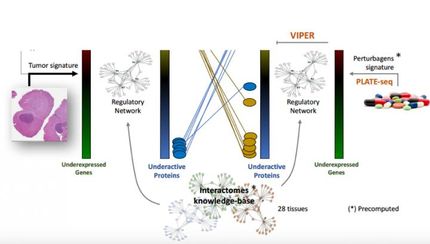Study shows that mutations in 1 gene cause many cancers
An important gene that normally protects the body against cancer can itself cause a variety of cancers depending on the specific mutation that damages it, according to a new study by investigators at the Ohio State University Comprehensive Cancer Center-Arthur G. James Cancer Hospital and Richard J. Solove Research Institute (OSUCCC-James).
The study examined mutations in a gene called PTEN. People who inherit a mutated copy of this gene have Cowden syndrome, a condition that carries a high risk of cancer in a number of organs, including the breast, thyroid and ovary. In addition, PTEN is frequently mutated in normal body cells leading to prostate, lung and pancreatic cancers. Why people with Cowden syndrome develop different cancers, or cancers that are more severe in some than in others, is unknown, though the cause is often attributed to the natural genetic differences that exist between individuals. This animal study, however, linked specific mutations in the gene to distinct kinds of cancer in organs targeted by the syndrome.
"We showed that the mutations themselves play a critical role in driving the cancers that occur in certain organs in people with Cowden syndrome," says principal investigator Gustavo Leone, associate professor of molecular virology, immunology and medical genetics at the OSUCCC-James. "Together, our findings demonstrate that specific inherited PTEN mutations have a strong influence in the variable predisposition to cancer of patients with Cowden syndrome."
The findings, published in Proceedings of the National Academy of Sciences of the United States of America, suggest that testing for specific PTEN mutations might predict the kind and severity of cancer that will develop in people with the syndrome. Furthermore, because PTEN is the second most commonly mutated gene in human cancer overall, the same mutations might predict severity in sporadic tumors, as well.
"Mutations in this gene also play a role in developmental disabilities and perhaps in autism, so this mouse model might be useful for studies in those conditions, as well," says co-principal investigator Michael Ostrowski, professor and chair of molecular and cellular biochemistry at Ohio State.
For this study, Leone, Ostrowski and their colleagues developed three strains of genetically identical mice, each of which had one of three specific PTEN mutations found in people with Cowden syndrome. This left each strain with a different version of the PTEN protein. The study showed that each version functioned in a different way, and each influenced cancer development to a different degree.
Mutation 1 disabled the protein altogether and often caused cancer in the animals, while mutation 2 produced a protein that was more active than the normal PTEN protein, and sometimes caused cancer. Mutation 3 altered the protein in ways that should have made it more cancer-causing but also made it more fragile, so less of the protein was present to cause problems. This mutation sometimes didn't cause cancer at all.
Using a database of more than 400 patients with Cowden syndrome, the researchers found that patients with these same mutations have cancer in the corresponding organs as the mice. The mice also showed equivalent gender differences in tumor development, with females developing more thyroid tumors, and males developing more adrenal gland and stomach tumors. The researchers are now investigating why patients may experience differences in cancer severity even when they have the same mutation.
Most read news
Topics
Organizations
Other news from the department science

Get the life science industry in your inbox
By submitting this form you agree that LUMITOS AG will send you the newsletter(s) selected above by email. Your data will not be passed on to third parties. Your data will be stored and processed in accordance with our data protection regulations. LUMITOS may contact you by email for the purpose of advertising or market and opinion surveys. You can revoke your consent at any time without giving reasons to LUMITOS AG, Ernst-Augustin-Str. 2, 12489 Berlin, Germany or by e-mail at revoke@lumitos.com with effect for the future. In addition, each email contains a link to unsubscribe from the corresponding newsletter.
Most read news
More news from our other portals
Last viewed contents
Chondromalacia_patellae

Nanostructures with living cells
Category:English_marine_biologists




















































